Figure shows two line sources of sound, separated by a distance 4 m.The two sources are in same phase at all times.The source emit same power and their lengths are also same.A detector moves along a circle with center at and radius 3m. The wavelength of the sound is 1m.When it is at A the intensity of sound due to source only is .
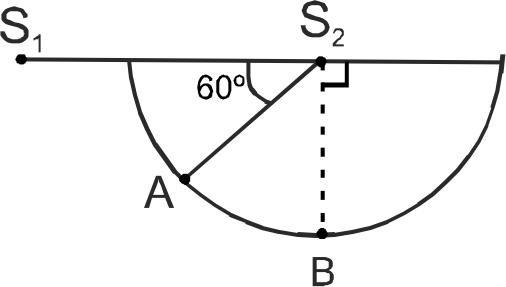
The intensity o sound of B due to is :
Applying cosine rule in the triangle .For line sources intensity is inversely proportional to the distance from the source.At A, let the intensity due to the source be I, then .
Similarly at B, let the intensity due to source be I', then .Path difference =2m=
the interference will be constructive
Topper's Solved these Questions
Similar Questions
Figure shows two isotropic point sources of sound, S1 and S2 The sources emit waves in phase at wavelength 0.50 m, they are separated by D = 2.20 m. If we move a sound detector along a large circle centered at the midpoint between the sources, at how many points do waves arrive at the detector (a) exactly in phase and (b) exactly out of phase?

View SolutionA line source of sound of length 10 m, emitting a pulse of sound that travels radially outward from the source. The power of the source is P = 1.0.x 104 W What is the approximated intensity I of the sound when it reaches a distance of 10 m from the source?
View Solution
Knowledge Check
Figure shows two line sources of sound, S1andS2 separated by a distance 4 m.The two sources are in same phase at all times.The source emit same power and their lengths are also same.A detector moves along a circle with center at S2 and radius 3m. The wavelength of the sound is 1m.When it is at A the intensity of sound due to source S2 only is I0.
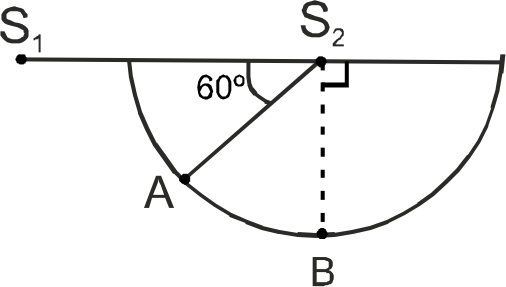
The intensity of sound at A due to S1 only is :A3I0√13B√13I03C9I013DI0Figure shows two line sources of sound, S1andS2 separated by a distance 4 m.The two sources are in same phase at all times.The source emit same power and their lengths are also same.A detector moves along a circle with center at S2 and radius 3m. The wavelength of the sound is 1m.When it is at A the intensity of sound due to source S2 only is I0.
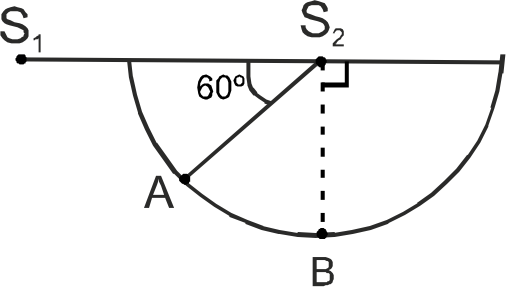
The intensity of sound at B due to S1 only is :A3I05B5I03C9I025DI0Two coherent sources S1 and S2 area separated by a distance four times the wavelength λ of the source. The sources lie along y axis whereas a detector moves along +x axis. Leaving the origin and far off points the number of points where maxima are observed is
A(a) 2B(b) 3C(c) 4D(d) 5
S1 and S2 are two sources of sound emitting sine waves. The two sources are in phase. The sound emitted by the two sources interfers at point F. The waves of wavelength :

View Solution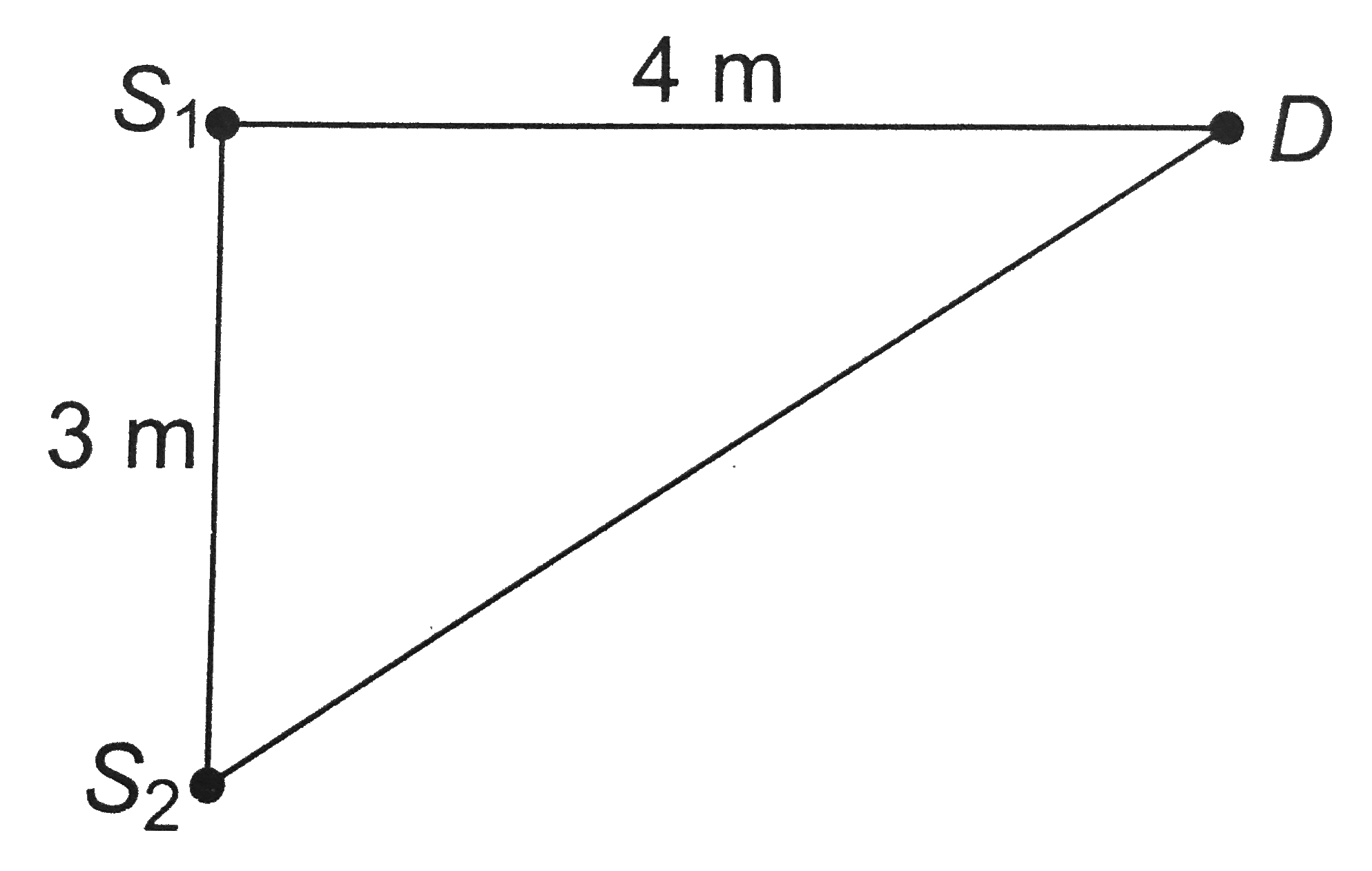
In the figure the intensity of waves arriving at D from two coherent sources S1 and S2 is I0 The wavelength of the wave is λ=4m. Resultant intensity at D will be:
View SolutionTwo radio frequency sources S1 and S2, separated by distance 2.5 m emitting in phase waves of wavelength 1m. A detector moves in a large circular path around the two sources in a plane containing them. The number of maxima that will be detected by it over the complete circular path. are
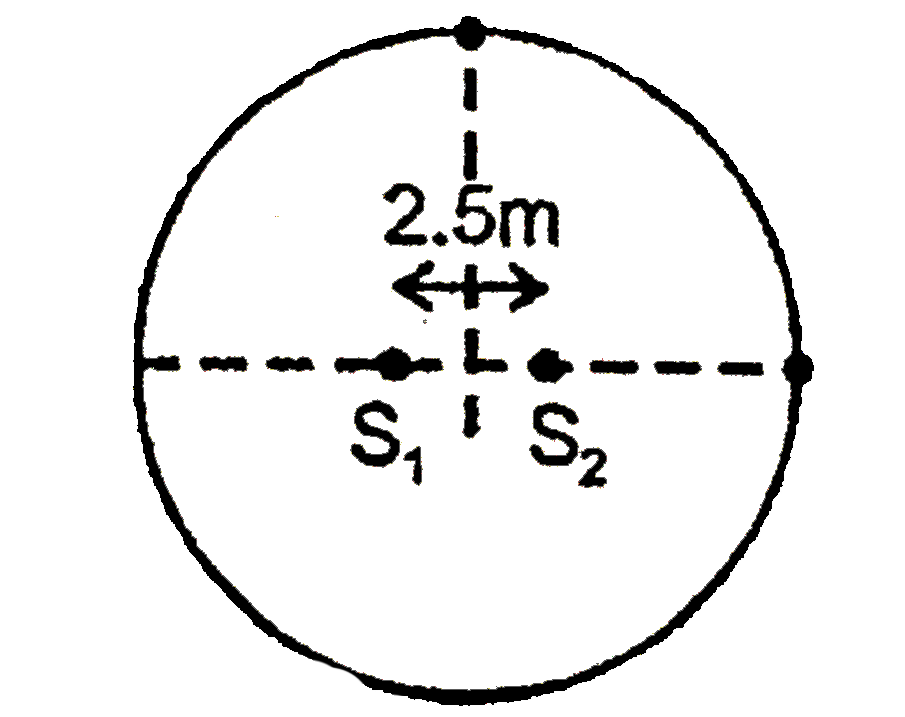
View SolutionS1andS2 are two coherent sources. The intensity of both sources are same. If the intensity at the point of maxima is 4Wm−2, the intensity of each source is
View SolutionThe wavelength is 120 cm when the source is stationary. If the source is moving with relative velocity of 60 m / sec towards the observer, then the wavelength of the sound wave reaching to the observer will be (velocity of sound = 330 m / s )
View Solution

